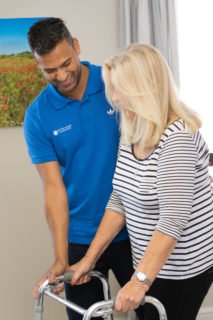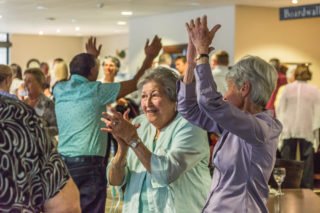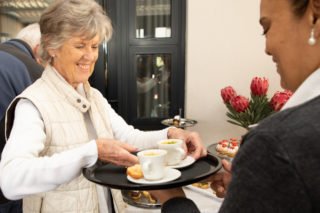Longevity Content Partnership: Do you have parents over the age of 60? If you do, most likely have had a discussion or two about how and where they will be living when it comes to their retirement. And in many cases, these aren’t easy discussions.
“The thing is, I just don’t want to move right now.”
“Stop worrying about us; we can still manage on our own.”
“What would I do with myself if I had to retire?”
Do any of these sound familiar?
In addition to a loss of independence, for some elderly people, there is still a stigma attached to retirement living. It is, after all, the last move of their lives. For this and other reasons, many people put off deciding on the matter – often leaving it until it’s too late.
Thankfully, nowadays, moving to a retirement village doesn’t mean you need to give up anything. It could be the best thing you could do for your lifestyle. Consider this. Firstly, you’ll be able to spend your golden years with fewer stressors and more time to enjoy your favorite pastimes. And secondly, you will be able to do so in an environment that is optimized for this stage of your life.
We spoke to some top medical professionals and legal experts about the benefits of this move. They explained the various elements that need to be considered when it comes to making this decision and helping one’s parents to make the transition.
What are the primary benefits of living in a retirement village?
- Safety and a trustworthy security system;
- Easy access to healthcare, with nurses on call;
- A community to settle into;
- An active social life;
- A variety of flexible options to choose from when it comes to ownership;
- Ease of living;
- Assisted living; and
- All manner of services conveniently located.
Enjoy peace of mind
According to geriatric psychiatrist Dr. Surita van Heerden, for many older people, a move into a retirement village or a home may signify a very positive change. “Where they have been previously isolated, they can now be part of an active community, together with peers and likeminded people.”
Also, psychologically, it offers the following benefits:
- Better stimulation;
- The opportunity to make new friends;
- Improved emotional and practical support;
- Fewer pressing responsibilities;
- A more stress-free lifestyle; and
- No need to worry about safety or finances.
“Many older people also enjoy setting up a new and much smaller home. They enjoy getting rid of clutter and non-essentials – this may resonate with their wish to live more simply and focus on their inner life and spirituality.”
Healthcare services are on your doorstep
In our later years, it’s natural that we’ll be needing more regular medical attention. Therefore, it’s best if we can access this easily.
Evergreen offers a continuous-care continuum, which includes:
- Primary healthcare;
- Home-based care;
- Recuperative (post-surgical) care;
- Frail care;
- Dementia care; and
- Palliative (end-of-life) care.
According to Arthur Case, brand marketing director for Evergreen, all of the large villages, as well as all the new villages, feature a care center offering continuous care. Moreover, the boutique sports a 24/7 clinic, offering primary healthcare.
“The clinics can serve to provide preventive health and wellness, and manage chronic conditions,” says Guin Lourens, nursing manager at Evergreen.
Home healthcare can offer support with activities of daily living if needed. Carers are screened for adequate credentials and supervised by a qualified nurse. Full-time home care or care in a care center can assist with frail care, memory care (Dementia/Alzheimer’s) and sub-acute periods, such as post-operative care.
 As we approach old age, the health challenges we might face can be varied. It can range from psychosocial and physical to medical. The village management – with input from the nursing team – typically helps to address issues such as isolation and loneliness by arranging rigorous activity schedules and social gatherings.
As we approach old age, the health challenges we might face can be varied. It can range from psychosocial and physical to medical. The village management – with input from the nursing team – typically helps to address issues such as isolation and loneliness by arranging rigorous activity schedules and social gatherings.
Moreover, Evergreen recognizes that most people have been comfortably established with their regular healthcare professionals over time. As a result, nursing service managers work to build networks with local GP’s, physiotherapists, occupational therapists, dieticians, biokinetics and many others, in the best interests of the residents. Nurses can also assist with screening for depression and dementia. They can help to refer patients to other health professionals and be part of the multidisciplinary team looking after the welfare of residents.
24-hour nurse call alarms
In the event of a medical emergency, Evergreen provides rapid response in the form of a 24-hour response system. The panic devices elicit an alarm which despatches an ambulance and a nurse, who attends until the paramedics arrive.
Legal Aspects to consider
Attorney Aaron Stanger from Aaron Stanger Associates outlines the different buying schemes:
1. Housing/life right schemes
These schemes are ideal for those who have less capital to invest because you are not purchasing the unit, only the right to use it for the remainder of your life. You enjoy benefits similar to those of sectional-title owners, with the added advantage that the developer remains the sole owner of each unit and carries the obligation to maintain it.
This scheme doesn’t involve any transfer of property, bond registration, transfer fees or VAT payable. There are therefore very few cost barriers to entry.
The scheme’s monthly levies and administration costs are generally lower, with developers being obliged by law to provide a two-year cost estimate in respect of levies. Reduced levies and greater levy transparency make it easier for members of a life rights scheme to plan financially for the future.
2. Development/sectional-title schemes
If you decide to buy a sectional title unit within a retirement village, you acquire full ownership of the unit. As such, you have to make sure that the registration of the property takes place through the Deeds Office. You will be liable for bond registration, transfer duties, and conveyancing fees.
Ensure that you are au fait with the provisions of the Sectional Titles Act, as the retirement complex is governed by these provisions. The Act also requires that a body corporate, comprising all unit owners, be formed. The body corporate assumes responsibility for the day-to-day administration and financial management of common property.
The developer of the sectional-title scheme bears no obligation for the ongoing maintenance once the development has been completed. These duties fall squarely on the shoulders of the home owners. This is why it’s important to have a detailed, all-inclusive breakdown of the levy structure of the village.
3. Share block schemes
In terms of this scheme, you will be issued with a share certificate once you purchase shares in the share block company. You effectively become a shareholder of the company. Because there is no immovable property involved in the transaction, the share block transfer is not registered through the Deeds Office. This doesn’t mean that transfer duty on the purchase price of the shares isn’t payable to SARS – it is.
 Costs on joining the share block scheme are much lower than purchasing a sectional title unit because there is no transfer of immovable property.
Costs on joining the share block scheme are much lower than purchasing a sectional title unit because there is no transfer of immovable property.
Company shareholders do not run the day-to-day administration of the company. It is the job of the directors who take all management decisions, leaving the shareholders with very little say as to how the scheme operates. Conversely to a sectional-title scheme, each shareholder must contribute towards a levy fund, which is used for the administration of the village. Maintenance concerning the shareholder’s unit remains the responsibility of the shareholder.
While the share block company is obliged to insure the property, each shareholder is responsible for insuring the contents of their unit.
What can children do to ease their parents’ transition?
Van Heerden explains that it’s best if the parent decides on their own, finds their own best option and moves to their primary choice when it’s still early enough for them to do so. Much difficulty arises when the parent senses a loss of control.
Some practical tips:
- Allow your parents to have a sense of control: where they’re moving, what to keep, etc.
- Prioritize compassion over your need to get things done.
- Assist with practical decision-making and packing.
- If your parent suffers from a medical or psychiatric illness, it might be helpful to get the support of a medical professional.
- Seek emotional and psychological support for yourself.
- All the children must agree with the decision and support one another in caring for their parents.
Longevity Content Partnership. 








![women [longevity live]](https://longevitylive.com/wp-content/uploads/2020/01/photo-of-women-walking-down-the-street-1116984-100x100.jpg)










